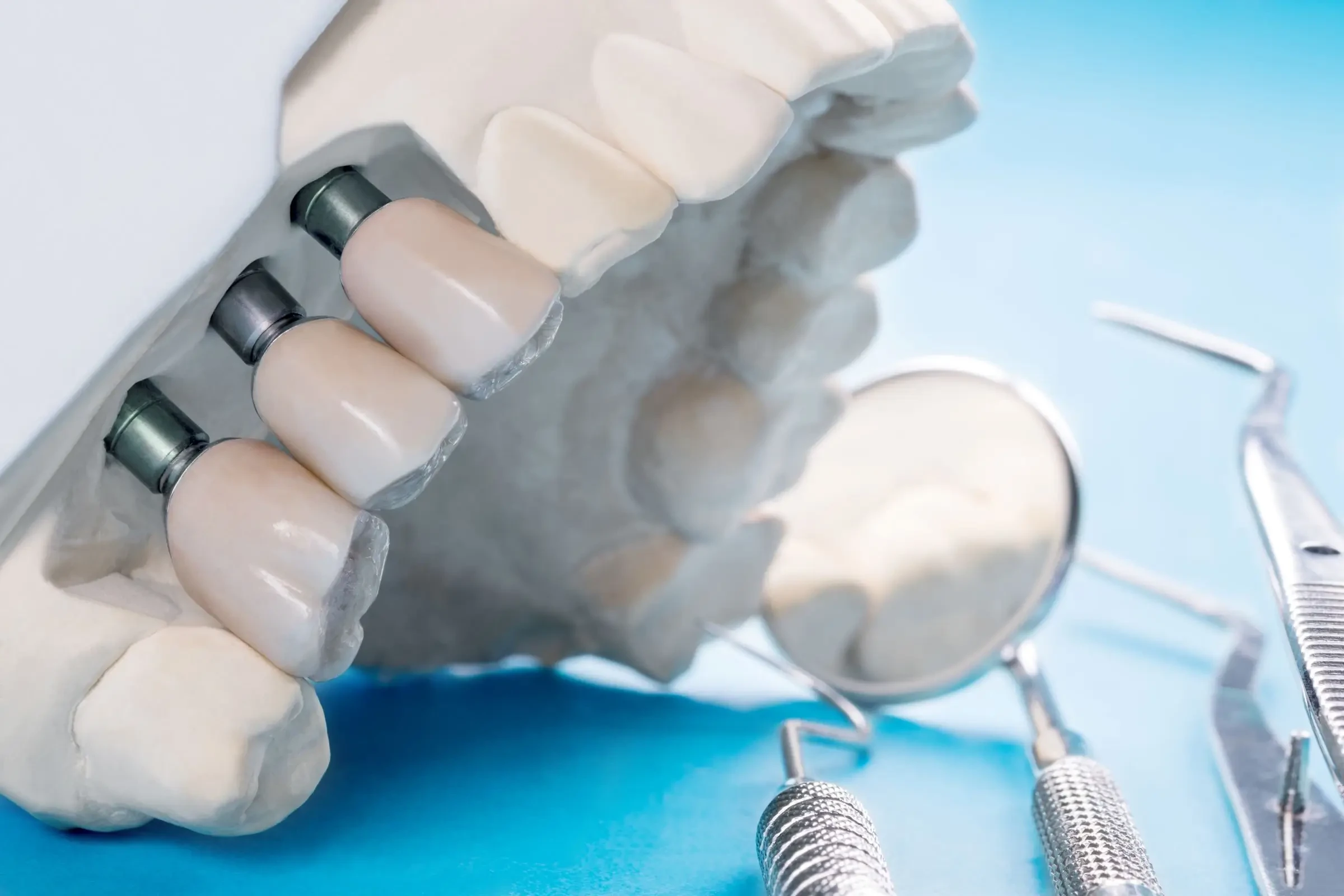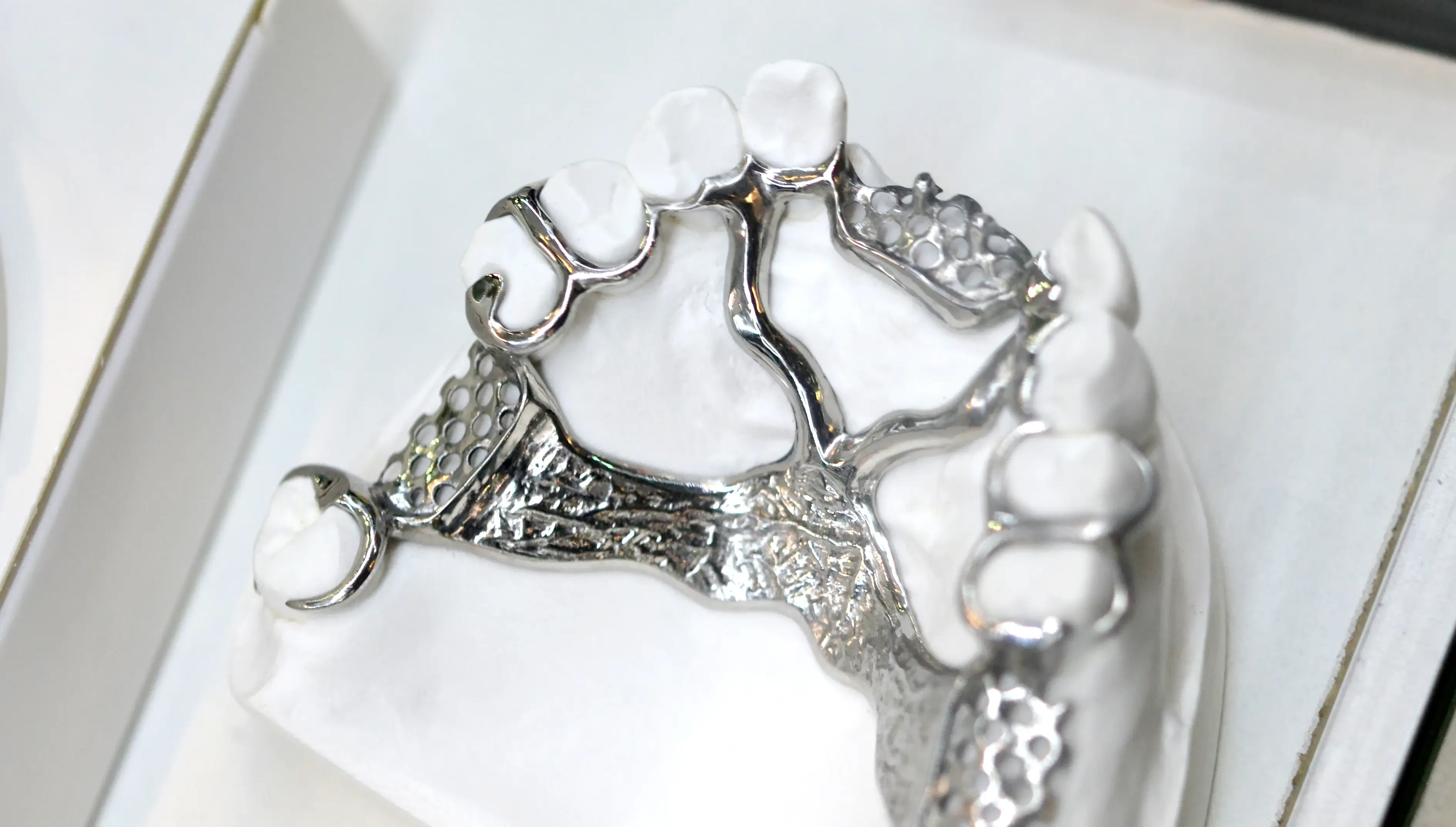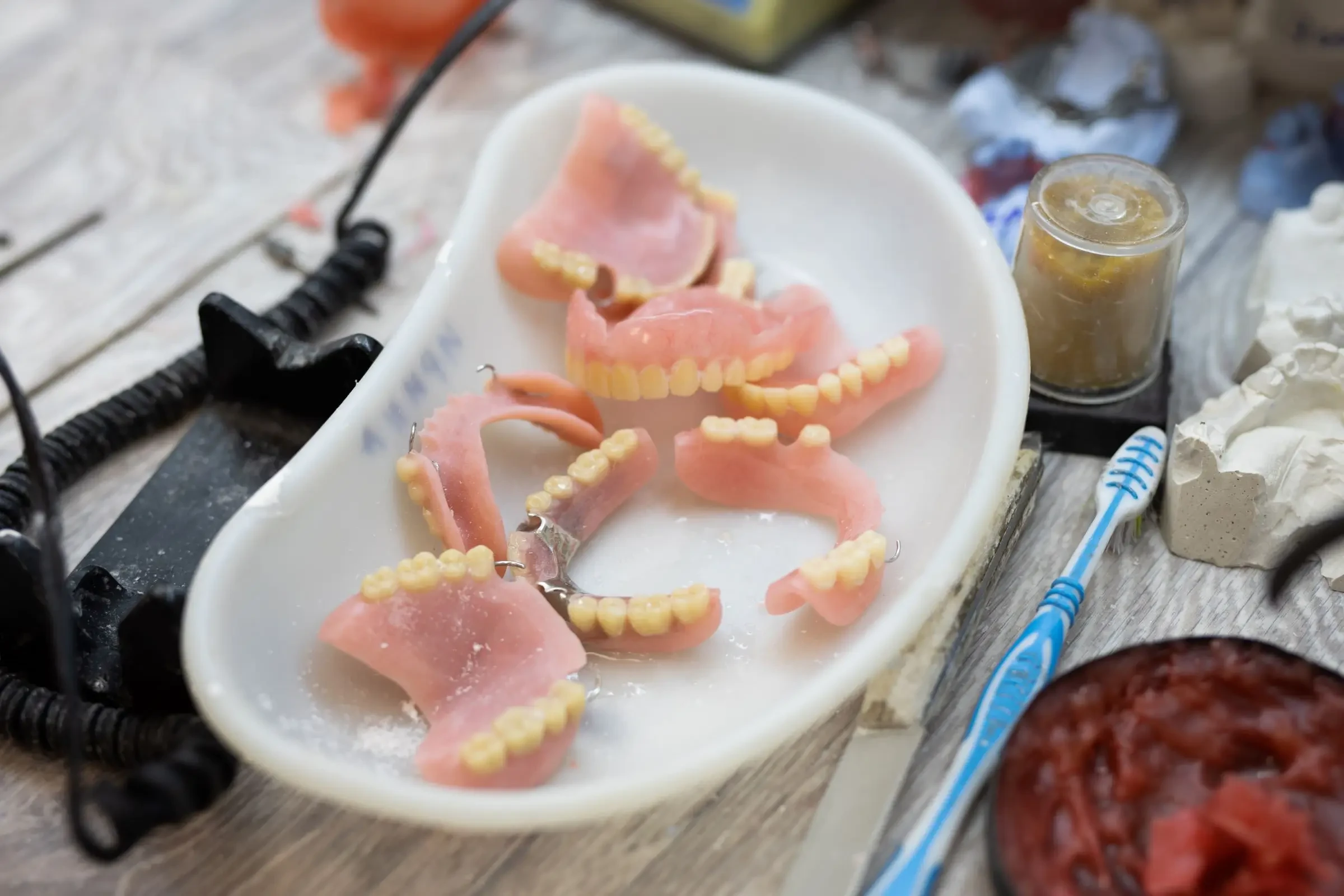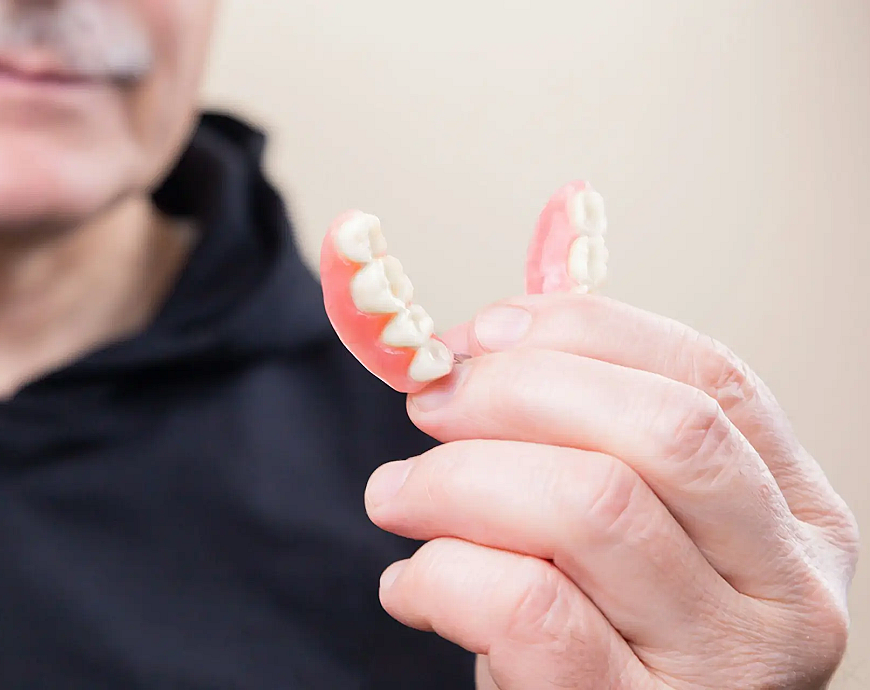Total edentation is the loss of all teeth. Numerous patients face this problem, which has a significant impact on the quality of life. In addition to difficulty of eating, speaking or smiling naturally, total edentation can also lead to changes in facial structure. Fortunately, there are solutions such as fixed or removable dentures that restore the functionality and aesthetics of the teeth and can allow patients to enjoy a normal and active life again.
What is a dental prosthesis?
Dental prosthesis is a medical solution that replaces lost teeth and restores the functionality and aesthetics of the teeth. Prosthesis are made of materials that naturally mimic the appearance of teeth and are used to replace missing teeth on the lower, upper, or both arches. It is customized according to the shape and size of each patient's oral cavity.
When is dental prosthesis recommended?
Dental prosthesis is recommended if the patient suffers from total or partial edentation, due to various causes, such as accidents, periodontal diseases or other dental problems.
If there are only a few missing teeth, you can opt for a partial dental prosthesis. Partial dentures replace missing teeth and help prevent the remaining natural teeth from migrating. Usually, mobile dentures are used, with staples or clips;
In the case of total edentation, total denture is recommended, which completely restores the dental arch and contributes to the improvement of mastication and speech.
Who needs a dental prosthesis?
Dental prosthesis is recommended to patients in several situations:
- If only a few teeth are missing from a dental arch;
- If patients have lost all teeth in one or both dental arches;
- If patients cannot opt for dental implants. Although dental implants are a more stable option in the long term, not everyone can opt for them for various reasons (financial, material allergies, non-existent amount of bone, medical conditions, etc.);
- If patients want a temporary solution until dental implants are placed in the future;
The dentist will determine if dentures are an option following the dental consultation.
Types of dental prostheses
Dental prostheses are of several types, divided according to the size and method of fixation.
Partial denture
They are recommended when the patient still has healthy natural teeth that can be preserved. The prosthesis is made around these teeth and fixed by special systems. They have a color similar to natural teeth and offer the most natural aesthetic appearance.
Full denture
Full dentures are the ideal solution for patients who have lost all their natural teeth, regardless of the cause (accidents, periodontal disease, infections or other medical conditions). The total denture helps to completely restore the dentition and has the role of restoring essential functions such as mastication, speech and facial aesthetics.

Removable denture
Mobile prostheses are recommended for patients who cannot opt for dental implants, for various reasons. They are very useful in cases where there is not enough bone for implants. The removable prosthesis can be applied even immediately after tooth extraction and can be easily removed by the patient for hygiene. However, it requires periodic visits to the dentist to correct any changes that may occur over time.
Fixed denture on implants
In this case, the dental prosthesis is mounted on the implants inserted in the maxillary or mandibular bone. Fixed dentures on implants are a more stable and durable solution than removable dentures. All on 4/ All on 6 systems are advanced implantology techniques that use a smaller number of implants (four or six) to support the dental arches. The method is ideal for patients who have lost all their teeth but do not have enough bone to support traditional implants. It is important to note that dental implants require healing time (usually several months) to integrate well into the bone.
Fixed prosthesis on implants cannot be removed by the patient, being permanent.

Skeleton denture
Skeletal denture is a removable, partial denture that attaches to natural teeth, not implants. They are anchored to the remaining natural teeth with the help of special metal systems such as staples, slides or hooks. It is recommended for patients who still have natural teeth on the dental arches, but cannot benefit from fixed prostheses or dental implants due to health conditions or other factors. Skeleton prostheses can be removed by the patient, but they are much more stable than classic mobile prostheses.

Roofless dental prosthesis
Palateless dentures are dentures that do not have a plate covering the upper palate. They are recommended for patients who have a sensitive pharyngeal reflex or who experience difficulties with traditional prostheses that cover the palate. Roofless dentures are arch-shaped and are used especially when all the upper teeth are missing. The base of the prosthesis is made of metal rings that are fixed on the dental implants.
The prostheses can be removed by the patient and are stably placed on the previous dental implants.

How much does a denture cost?
The cost of a dental prosthesis varies depending on the type of prosthesis chosen, the materials used, the complexity of the work and whether there are other additional procedures.
Consult a specialist dentist to receive a detailed treatment plan. The doctor will decide which is the most suitable type of prosthesis and will be able to assess the total costs of the procedure.
Dental prosthesis - Price
At DentArbre Dental Clinic, the costs associated with a dental prosthesis are:
| Types of dental prosthesis | Price RON |
| Acrylic prosthesis per arch | 2.400 RON |
| Partial / total flexible prosthesis - Flexiplast | 3.300 RON |
| Dental prosthesis repair | 300 RON |
| Prosthesis on implants | 7.500 RON |
For more details on the rates of our services, please contact us.
How to make a dental prosthesis
Prosthetic treatment involves several important steps. Each contributes to the final result that ensures the functionality of the teeth and a pleasant aesthetic appearance.
Stages of dental prosthesis treatment
The stages of dental prosthesis treatment are:
The consultation: the dentist will assess the general condition of the oral cavity and identify any existing problems that need to be solved before starting the treatment. Also during the consultation, he will discuss all the treatment options suitable for the patient;
Impression: an impression of the dental arch and registration of the occlusion is made so that the prosthesis perfectly fits the patient's anatomical structure;
Making the prosthesis in the laboratory: after the impression, the prosthesis is manufactured in the dental laboratory, where the shape, color and dimensions necessary for a personalized result are taken into account;
Final fitting: After the prosthesis is made, adjustments are made to make the prosthesis fit and comfortable for the patient.
The time required to complete the prosthesis
The time required to complete the prosthesis varies depending on its type. For a classic denture, which does not include modern fastening systems, the patient will be able to use it in about a week after the impression is taken. In contrast, a fixed prosthesis on implants requires an interval of 4-6 months to complete, as it involves several steps, including the integration of the implants into the bone. The exact duration will be discussed with the dentist, depending on the final option chosen.
Oral hygiene when wearing dentures
Adequate oral hygiene should not be neglected when the patient wears dentures. Dentures must be properly sanitized to prevent plaque build-up and problems such as gingival irritation or infection. Also, if there are any remaining natural teeth, they should be properly cared for and brushed to prevent the growth of bacteria in the oral cavity. It is recommended to use dental floss to effectively clean the spaces between the teeth and the prosthesis, where the brush cannot reach.
The removable denture must be removed daily and cleaned with specially designed sanitizing solutions. The removable prosthesis should be left in these solutions to prevent drying and damage.
The benefits of dental prostheses
Dentures can bring many benefits to the patient. These include:
- Restoring the natural appearance of the teeth. Dentures help with a natural smile, which can improve the patient's self-confidence;
- Improving the functionality of the teeth. The prosthesis allows the patient to eat and speak more effectively;
- Durability and flexibility. Dentures adapt to the shape of the oral cavity and are made of durable materials such as acrylic and chrome;
- Improving oral health. Missing teeth can cause various oral conditions, and dentures help prevent them.
Frequently asked questions about dentures
Frequently asked questions about dentures relate to important aspects such as maintenance, fitting, care of dentures, but also the choice between dentures and dental implants.
Photo source: Unsplash, Freepik
Bibliography:
- www.webmd.com, https://www.webmd.com/oral-health/dental-health-dentures, accessed on 27.11.2024;
- www.nhs.uk, https://www.nhs.uk/conditions/dentures/, accessed on 27.11.2024;
- my.clevelandclinic.org, https://my.clevelandclinic.org/health/treatments/10900-dentures, accessed on 27.11.2024;
- www.bupa.co.uk, https://www.bupa.co.uk/dental/dental-care/treatments/dentures, accessed on 27.11.2024.

Dr. Nicoleta Taran answers questions:
+40787877799
contact@dentarbre.comZona Obor - Colentina - Doamna Ghica, București, Romania
